SITE GUIDE
SEARCH
REVIEWS
FEATURES
NEWS
&cetera and
Short Term Listings
LISTINGS
Broadway
Off-Broadway
NYC Restaurants
BOOKS and CDs
OTHER PLACES
Berkshires
London
California
New Jersey
DC
Philadelphia
Elsewhere
QUOTES
TKTS
PLAYWRIGHTS' ALBUMS
LETTERS TO EDITOR
FILM
LINKS
MISCELLANEOUS
Free Updates
Masthead
Writing for Us
CurtainUp Reviews
The Barrington Stage Summer 2007 Season
By Elyse Sommer
The Mysteries of Harris Burdick (not a review!)
Uncle Vanya
Funked Up Fairy Tales
Black Comedy
High School Musical
High School Musical --Barrington Stage's Youth Theater Is Part of the disney Phenomenon
Calvin Berger
West Side Story
Marni Nixon: The Voice of Hollywood-6/10/07 only special performance (an update of a 1999 review and thus on a separate page)
About this All-In-One Format: Since summer theater productions run such a short time, we've decided to try something new this summer. Instead of retiring each show after it makes way for the next production, we're putting details and reviews of shows at a particular theater on one page so that everything remains at your fingertips. No need to click to the archives unless you are looking for something from a past season.
The list is organized in order scheduled. A click on a show will jump you down to that show's details-- an * asterisk before a title indicates that a review is posted.
|
|
Union Street, Pittsfield
413 236-8888
Shows To Be Covered
Click show title for basic details * added when review is posted
Shows to be covered
An * will be added when a review is posted.
Main Stage-Berkshire Music Hall
Tuesdays and Wednesdays at 7 pm
Wednesdays at 2 pm (Unless otherwise announced this matinee performance for West Side Story only) & 7 pm
Thursdays at 8 pm, Fridays at 2 pm & 8 pm
Saturdays at 8 pm,
Sundays at 5 pm.
Tickets:$34-$54
previews $20 (orchestra) $15 (mezzanine).

The addition of a mezzanine brings the Berkshire Music Hall's seating capacity to 533 seats-- all with excellent sightlines.
(Photo: Charlie Siedenberg) |
*High School Musical--Barrington's Youth Theatre
June 13-21 to July 14, opening June 24.
*West Side Story
June 13-21 to July 14, opening June 24.
(Note: Wednesday and Friday matinees) *Black Comedy
July 19 to August 4; opening July 22.
*Uncle Vanya
August 9 to 26; opening, August `1

William Finn, the Musical Theater Lab's mentor
(Photo: Elyse Sommer)
|
1 Wendell Ave, Pittsfield
Wednesdays and Thursdays at 7 pm
Fridays and Saturdays at 8 pm
Sundays at 3 pm
Musical Theater Lab-Atheneum
1 Wendell Ave, PittsfieldTuesday through Friday at 7:30pm, Saturday at 4pm and 8pm.
General Admission, $25 and $30; $15 in preview.
Calvin Berger
June 26 to July 14; opening July 2
Funked Up Fairy Tales
July 31 to August 11 Not open for review policy changed with extension through August 18.
The Mysteries of Harris Burdick
August 21 to September 1 (Unless otherwise decided, not open to review). High School Musical-Youth Theatre Production
July 17 to August 19
High School Musical
Barrington Stage Company,s Youth Theatre in Pittsfield is presenting Disney,s High School Musical, an international phenomenon of grand proportions. Debuting in the United States on January 20, 2006, the movie has been telecast on every continent, won numerous awards in various categories, spawned a stage production and will be performed on ice at the end of 2007. Almost everyone,s high school experiences, regardless of age, are onstage in this enjoyable piece of fluff. This undoubtedly accounts for the great popularity the show has accrued.
The original movie was written by Peter Barsocchini with music and lyrics by eleven others. The show is a depiction of teen-age life in a stereotypical high school, but probably not that of an inner-city school. With that caveat, the show has nothing new to offer, but it is entertaining.
A take-off on Romeo and Juliet, the protagonists, Troy, the star basketball player, and Gabriella, the shy newly transferred student, are manipulated by Albuquerque,s East High School,s several cliques including the Jocks, the Brainiacs, and the Drama Club, plus the drama teacher and the basketball coach. The typical adolescent jealousies, egocentrism, and vulnerabilities are all core to the relationships fostered by the competition among the artsy, the jocks and the nerds.
Teen-age anxiety is a favorite theme of movies, television, music, books, advertisements, magazines. . .even Harry Potter questions his relationship with friends, both male and female, while confronting the titanic conflicts thrust at him. In HMS, this angst is made palatable and, of course, everything ends happily.
The musical makes a case for understanding and appreciating other people,s difference and varying abilities. Troy, for instance, likes to sing, but his teammates and coach, who is also his father, deride that talent. The song "We,re All in This Together" serves as the theme as it provides various characters an opportunity to demonstrate their hidden talents, interests and, thereby, their personal lives. This number is the statement the entire show is preaching.
For the show to work, the cast has to be energetic and eminently likable, including the villains. Considering that the cast is predominantly young, only two adults are in the cast, youthful vitality possesses the innate ability to cover rough spots and weaknesses in the book.
The musical numbers set toes-tapping and plaster smiles on the audience,s faces. It is not great music, but it supports the intent and tone of the show, which is to put everything into a Disney-like "It,s a small world." Upon reflection, one should remember that this is a corporate, commercial production. True, adolescence is a very difficult life period, but the glossy and fresh-scrubbed characters in HSM, despite their problems, are not fully indicative of all high school populations.
This summer, in particular, the show is sweeping the country in venues from coast to coast. Barrington Stage,s production effectively hits all the high notes with vigor and intelligence. The cast is energetic, singing the wide spectrum of songs with insight and flair. The dances staged by director/choreographer Christine O,Grady, especially "Get,cha Head in the Game," which centers on a basketball practice session, and "We,re All in This Together," are performed with exuberance and assurance. The enthusiasm of the young cast is contagious; one cannot leave this theatre without smiling.
— Revoewed by Gloria Miller
|
BARRINGTON STAGE'S DISNEY'S HIGH SCHOOL MUSICAL Directed and Choreographed by Christine O,Grady Book by David Simpatico Original songs by: Matthew Gerrard and Robbie Nevil; Ray Cham; Greg Cham and Andrew Seeley; Randy Petersen and Kevin Quinn; Andy Dodd and Adam Watts; Bryan Louiselle; David N. Lawrence and Faye Greenberg; Jamie Houston Music Adapted, Arranged and Produced by Bryan Louiselle Based on a Disney channel Original Movie Written by Peter Barsocchini Cast (In alphabetical order): Kathryn Burgner (Cheerleader, Classmate, Performance Art Kid,) Will Carey (Teammate, Kratnoff, Alan, ) Shaina Chappell (Cheerleader, Susan, ) Mitchell Despain (Teammate, Jack Scott) Patience Fairbrother (Cheerleader, Cyndra, Mongo), Mitch Galli (Teammate, James,) Stephanie Hedges (Ms. Darbus,) Bob Herr (Coach Bolton) Christopher Herr (Troy Bolton,) Mark Kenyon (Zeke Baylor) Jessica Kingsdale (Sharpay Evans,) Benjamin Krol (Chad Danforth,) Colin Mackey (Teammate, Performance Art Kid, Ripper,) Tess McHugh (Martha Cox,) Jesse Rothschild (Gabriella Montez,) Anna Shields (Kelsi Neilson) Frances Slote Cheerleader, Classmate, Performance Art Kid,) Jerome Spratling (Teammate,) Tyler Stanton (Ryan Evans,) Alexa Veeder (Taylor McKeesie) Set Design: Eric Broadwater Costume Design: Guy Lee Bailey, and Kristina Sneshkoff Lighting Design: Garrett S. Herzig Sound Design: Daniel A. Little and Sun Hee Kil Music Director: Brian Usifer Running time: 2 hours; one intermission Barrington Stage Company, First Congregational Church, 27 East Street, Pittsfield, MA, 413-236-8888 7/18-8/19; opening 7/20/2007 Wed. —Sun. at 7 PM; Thurs., Sat. & Sun. at 2 PM Tickets: $10-$15 |
|
Musical Numbers
| |
Act One
|
Act Two
|
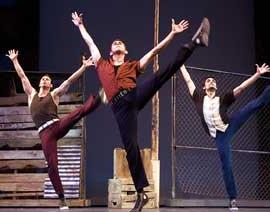
Three of the Sharks: Joey Calveri (Pepe), Freddy Ramirez (Bernardo), and Manuel Santos (Indio) in West Side Story
(Photo: Kevin Sprague) |
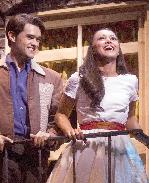
Tony (Chris Peluso), Maria (Julie Craig)
(Photo: Kevin Sprague) |
Somewhere we'll find a new way of living
We'll find a way of forgiving
— from Somewhere, just one of the many gorgeous tunes that have made West Side Story one of the best ever musicals.
We'll find a way of forgiving
— from Somewhere, just one of the many gorgeous tunes that have made West Side Story one of the best ever musicals.
Speak of perfect timing! This is the 50th Anniversay of West Side Story, the musical that brought together four legendary talents — Leonard Bernstein (music), Stephen Sondheim (lyrics), Arthur Laurents (books), and Jerome Robbins (choreography) — and comes with the fail-safe pedigree of a classic that ranks at the top of mid-twentieth century classic musicals. Barrington's can-do artistic director Julianne Boyd couldn't have picked a better show to launch her company's first full season in its spiffy new home in Pittsfield. Given Leonard Bernstein's long association with the Tanglewood Music Festival, this celebration, just a twenty minute car ride from that festival, is particularly meaningful for Berkshire audiences.
Except for Justin Bohon, whose graceful, soaring leaps I've seen on Broadway, and who plays Riff, the main man of the Jets in this production, I didn't know any of the large cast Boyd has assembled. Even without a single name with big box office caché, however, this is a memorable, smartly staged production that does full justice to the gorgeous score and dancing. The twenty-five performers act and sing magnificently and superb hardly does justice to their dancing.
Luke Hegel-Cantarella has effectively recreated the pre-gentrified Manhattan Hell's Kitchen scene, with props for various locations rolling on stage or sliding up and down. Anne Kennedy's colorful costumes define the characters and the 1950s era. Scott Pinkney's lighting supports the shifting moods and is particularly effective in the breathtakingly beautiful dream sequence, "Somewhere." Best of all, the new theater's sound system allows Sondheim's clever lyrics to be heard with minimal miking. In short, here's a musical on a par with anything you might see on Broadway but — hurrah! hurrah!— with the songs coming from the stage and without the hollow, over-amplified sound that has become synonymous with so many Broadway musicals.
In the spirit of West Side Story's anniversary, Ms. Boyd has staged it in accordance to the original concept by Jerome Robbins, without any of his dances cut (as they were in the 1961 film) or any attempt to give any new-fangled twist to Arthur Laurents' book. The film and the many regional productions make any great detail about that book superfluous. Suffice it to say that the scene is New York's mean streets circa 1950 instead of the Verona of Shakespeare's play; the two rival factions are represented by two gangs of young hoods, the Jets (offspring of white European immigrants) and the Sharks (new wave Puerto Rican immigrants); and the famous balcony scene is plays out on a tenement fire escape.
Choreographer Joshua Bergasse, who has been in numerous productions of the show, has recreated Robbins' exhilarating choreography—complete with the propulsive, jutting arm and leg movements and amazing leaps that articulate the anger, hostility, suspicion and yearning of the characters. It's all of a piece with the peppery and varied score.
With Boyd marshaling her cast to perform as a well-oiled ensemble, everyone is a star. Julie Craig and Chris Peluso are sincere and poignant as the star-crossed lovers and their singing is first-rate. The already mentioned Justin Bohon, fully inhabits Riff, the Jets' hot-headed current leader whose declaration in "The Jet Song" ("When you're a Jet, you're a Jet all the way/From your first cigarette to your last dyin' day! ") is tragically prescient. Freddy Ramirez as Bernardo, Riff's opposite in the Sharks, is aptly sinister yet tragic—and, typical of the cast, a terrific dancer. Jacqueline Colmer is a fine, sassy Anita (the part played by Chita Rivera in the play and Rita Moreno in the movie). I could go on, but you get the idea. This show calls for a standup-and-cheer curtain call for everyone, whether on stage or behind the scenes.
The subject of West Side Story — racism and intolerance in America— is not beautiful with Maria's joyously hopeful "I Feel Pretty" doomed to be short term. I wish that the problems of inner city youths, immigration and racial conflict were more dated. Unfortunately, while Hell's Kitchen is no longer an ugly urban jungle, the troubles depicted are still with us and have, in fact, spread all over the United States. Fortunately, the creators of West Side Story and Julianne Boyd have drawn beauty out of bedlam.
Much as I loved seeing this terrific production of this still re;evamt golden oldie, I'm not of the school ready to write off new musicals as unable to bring another golden era. The past New York theater season has shown encouraging signs that the musical theater is not in danger of succumbing to horridly over-miked, banal juke box musicals but that new ground breaking works are being created. Take Spring Awakening (review), which deservedly nabbed every major musical honor handed out during the recent awards season. It may have a different sound and look than West Side Story but it can be viewed as a direct offspring of its creators' commitment to vibrant, relevant musical story telling. At Barrington Stage, audiences have a chance to once again revel in a classically hummable show and perhaps also discover another Spring Awakening in the making at Barrington's Musical Theater Lab program which has already seeded an Off-Broadway run for last summer's Burnt Part Boys (review).
Consumer note: Unlike most summer theater shows (including the rest of Barrington Stage's offerings for summer 2007), West Side Story was scheduled for a 5-week run. It also has a Wednesday matinee, so there's no excuse to miss it.
—Reviewed by Elyse Sommer on June 20th.
|
Based on conception of Jerome Robbins, director/and choreographer of original production Book by Arthur Laurents Lyrics by Stephen Sondheim. Music by Leonard Bernstein Directed by Julianne Boyd Choreographer: Joshua Bergasse Cast: Julie Craig as Maria, Chris Peluso as Tony, Jacqueline Colmer as Anita, Freddy Ramirez as Bernardo, Justin Bohon as Riff, Beth Crandall as Anybodys, Gordon Stanley as Doc, Dale Radunz as Lt Schrank & Glad Hand, Xavier Cano as Nibbles,, Nicky Cooper as Teresita, Billy Fagen as China,, Matt Gibson as Diesel, Melinda Hall as Minnie, Spencer Howard as Big Deal and Snowboy,, Joey Calveri as Pepe, Jamie Markovich as Velma, Michael McGurk as Action, Michael Mindlin as Baby John, Kristin Piro as Consuela, John Raterman as A-Rab, Rebecca Riker as Francesco, Manuel Santos as Indio, Kiira Schmidt as Gaziela and Dance Captain, Vanessa Van Vrancken as Rosalia. Scenery: Luke Hegel-Cantarella Costumes: Anne Kennedy Lighting: Scott Pinkney Sound: Randy Hansen and Matt Krauss Band: Conductor and Musical Director/ Darren R. Cohen; Asst. Conductor-Keyboards /Brian Usifer; Violin /Edmund Bagnell; Cello / Peter Zay; Reed 1 /Bruce Krasin; Reed 2 /Charlie Tokarz; Trumpet 1 /Jeff Stevens; Trumpet 2 /Pete Grimaldi; Trombone/ Dave Wampler; Percussion 1 /Dennis Arcano; Percussion 2 /Jeff Roberts; Bass /Jeff Link Reviewed by Elyse Sommer on June 20th |
|
Musical Numbers
| |
Act One
|
Act Two
|
Black Comedy
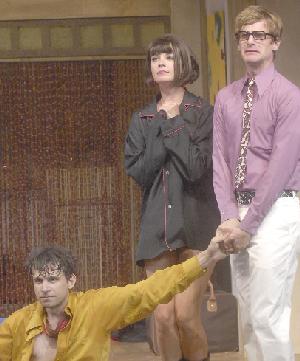
Brian Avers as Brindsley Miller, Ginifer King as Clea and Mark H. Dold
as Harold Gorringe in Barrington Stage Company's production of Peter
Shaffer's Black Comedy
(Photo: Kevin Sprague)
|
I've got a foreboding. It's all going to be a disaster. An A-one copper-bottomed, twenty-four carat disaster!—Brindsley.
Peter Shaffer's best know plays — Amadeus, Equus and Lettuce and Lovage— have all enjoyed excellent revivals during recent summer seasons; the first two at Berkshire Theatre Festival and the last at Shakespeare & Co. Now, Barrington Stage rounds out Shaffer's Berkshire area visibility with Black Comedy, a farce that relies for its fun on the way the playwright, inspired by an ancient Chinese Theater convention, has skewered our view of bright daylight and pitch black darkness. Thus most of the action in the Kensington apartment of a young, starving artist named Brindsley Miller (Brian Ayers) takes place during a power outage. The outage notwithstanding, the apartment we see on stage is bright and quite visible, while Miller and assorted expected and unanticipated guests will be seen fumbling around as if light was indeed dark. If anyone strikes a match, the light promptly dims.
This sure-fire formula for mishaps galore has been a hit on the regional circuit for more than forty years. And I'm not being a spoiler when I tell you that Brindsley's foreboding about two visitors coming to his Kensington apartment are justified.
Shaffer starts things off with the audience looking at a black stage listening to Brindsley and his fiancee Carol Melkett (Nell Mooney) discussing the situation that paves the way for the disaster-prone scenario.
From their talk about what they can see but we can't, it's established that in order to impress Georg Bamberger (Robert Lydiard), a European millionaire and potential patron, Brindsley and Carol have temporarily traded his shabby furnishings for some classier pieces (including a valuable Buddah sculpture belonging to absent neighbor Harold Gorringe (Mark H. Dold). As Bamberger will be appraising Brindsley's art, so Carol's martinet father Colonel Melkett (Gerry Bamman) is headed to Kensington to examine Brindsley suitability as a husband.
The nervous tension about the borrowed furnishings and having the millionaire's and the Colonel's visit coming on the same evening is of course exacerbated by the power outage. Disaster is piled upon disaster. The Colonel arrives first. He's followed by a prudish, teetotaling spinster who ends up getting drunk. Worse yet, there's the unanticipated early return of Harold. What about the millionaire art patron? He's listed in the program (Georg Bamberger), so he does show up —but not until after Schuppanzig (Gordon Stanley) a workman from the Electricity Board who's mistaken for him.
While lacking the star power of their forerunners (Derek Jacobi, Albert Finney and Dame Maggie Smith in the London premiere; Geraldine Page, Lynn Redgrave, Michael Crawford and Donald Madden on Broadway), the Barrington Stage farceurs have a fine time with the gimmick that drives this farce. They totter around, miss getting entangled with each other and colliding with furniture by inches that send the audience into gales of laughter. The bulk of the physical comedy falls to Brian Avery's Brindsley and his timing as he tries to return the borrowed furnishings to Harold's apartment couldn't be better. The characters are all pretty much stock types, but the cast is funny enough to keep audiences laughing at their familiar quirks nevertheless. Mark Dold and Beth Dixon stand out as the effeminate Harold and suddenly uninhibited Miss Furnival. Ginifer King is not only the best looking performer on stage, but gives a knockout performance as Brindsley's old girl friend, Clea. King is especially amusing in one scene where she pretends to be a Cockney cleaning woman.
Director Lou Jacob keeps the actors stumbling and fumbling along without too many lapses between laughs and the production values are top notch. It would have been nice to sandwich something newer and edgier than this forty-year-old, single gimmick farce between the great musical (West Side Story) that opened the first Main Stage season and the great drama (Uncle Vanya) scheduled to close it. Still, this is clearly a crowd pleaser and there's no doubt that the crowd at the opening performance I attended was pleased.
—Reviewed by Elyse Sommer on June 22nd.
|
Black Comedy, a Farce By Peter Shaffer, Directed by Lou Jacob Cast: Brian Avers (Brindsley Miller), Nell Mooney (Carol Melkett), Beth Dixon (Miss Furnival), Gerry Bamman (Colonel Melkett), Mark H. Dold (Harold Gorringe), Gordon Stanley (Schuppanzigh), Ginifer King (Clea). Set Design: Karl Eigsti Costumes: Ilona Smogyi Lighting: Scott Pinkney |
Uncle Vanya
Scenes From a Country Life in Four Acts
|
I'm so unhappy — Vanya. I know but we have to go on living—Sonya, who is herself unhappy in the knowledge that her love for Doctor Astrov is hopeless. In fact, unhappiness and boredom afflicts everyone, including her beautiful stepmother whose declaration of boredom she intercepts with "Don't be bored, it's contagious." |
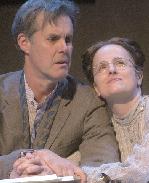
Jack Gilpin and Keira Naughton as Uncle Vanya and niece Sonya
(Photo: Kevin Sprague)
|
For her directorial initiation as a Checkhov director, Julianne Boyd has avoided erring in either direction by using Checkov scholar Paul Schmidt's translation which is rich in humor and also has dialogue that is contemporary but otherwise remains faithful and true to the plot. That plot is simple but rich with opportunities for finely nuanced performances: A retired professor (Kenneth Tigar) and his young second wife Yelena (Heidi Ambruster) return to the family estate which has been supporting him thanks to its management by his daughter Sonya (Kiera Naughton) and her Uncle Vanya (Jack Gilpin). The visit disrupts everyone's daily routine and also has romantic and financial repercussions — most of all on Uncle Vanya, who has become disillusioned with the professor's brilliance and fallen in love with the professor's wife. Also smitten with the lovely (but also bored Yelena) is Astrov (Mark L. Montgomery), the local doctor, who is in turn loved by the plain Sonya. The only one oblivious to the disruptive climate is Sonya's maternal grandmother Maria (Alaina Warren Zachary), whose head is buried in feminist tracts and for whom the Professor is still a beloved son-in-law who can do no wrong.
To establish the atmosphere of the Russian countryside circa 1898 and launch this fresh yet classic production, we have a musical prologue by Telegin (Robert Grossman, a professional folk singer and guitarist), one of the play's minor characters. Since Telegin is a poor neighbor and frequent visitor to the estate, he handily and effectively provides incidental music during scene changes.
How do the actors in the most significant roles fare? Jack Gilpin, is not someone who would spring to mind as Vanya. Like Boyd he is new to Chekhov. Initially he seems a bit too flippant and gentleman farmer-like but his Vanya's rage catches fire by the time we get to his anguished confrontation with the brother-in-law he's come to despise and resent. He has a good handle on the humor of the gun toting episode that epitomizes his ineptness and is wonderfully poignant when he wordlessly witnesses Yelena' in Astrov's arms and his finale scene with Sonya.
Astrov, whose attraction to Yelena have caused him to interrupt his exhaustingly busy medical practice, is not quite the tired man who's aged faster than his forty-seven years suggested by Chekhov's text. But his being quite handsome and vibrant isn't a bad thing and his extended goodybyes, especially at the end, round out another portrait of an intelligent individual who is the major contributor to his own frustrations. While he sees the beauty and importance of the trees to preserve nature's equilibrium, his inability to respond to Sonya's inner beauty and love is truly a case of not seeing the trees for the forest.
Kiera Naughton is a tremendously affecting Sonya: innocent but a mature peace keeper, hard working and loyal, touchingly joyous in her newly formed bond with her stepmother and touchingly realistic about and sensitive to her being a plain girl whose only compliments are that she has beautiful hair. She was quite good but a bit too young for the part when she played Sonya eight years ago in a modern, Americanized adaptation called Uncle Jack (Uncle Jack). While age hasn't exactly withered her (she still needs rimless glasses and a wig to hide that she's a very attractive young woman), time has matured and deepend her acting skills.
Heidi Ambruster who made quite a splash last season in an Off-Broadway revival of Tea and Sympathy (review) is not only breathtakingly lovely as the young wife trapped in a May-December marriage, but captures the pretty woman's particular type of insecurity in her declarations about feeling trivial. But there's nothing trivial about Ambruster's performance. Her attraction to Astrov and the see-sawing between desire and conformity resonates powerfully.
Patricial Connolly's Marina lends a warm presence to the play. Kenneth Tigar is fine as the Professor, but considering the impact of his career and the current visit on all the other characters, his role is quite minor, which is even more true for Alaina Warren Zachary's matriarch.
Set designer Karl Eigsti has created an unfussy, uncluttered but inventive set that evokes both the estate interior and the expansive countryside outside. The set is made extra effective by Scott Pinkney's lighting. Elizabeth Flauto rounds out the production's visual virtues with handsome and apt to the characters and period costumes.
This is the last main stage production of Summer 2007, and it makes an enjoyable bookend for the musical classic (West Side Story) that opened the season. For more about Chekhov and links to other Uncle Vanya productions reviewed at Curtainup, see our Chekhov Backgrounder. —Reviewed by Elyse Sommer
|
Uncle Vanya, Scenes From a Country Life in Four Acts Translation by Paul Schmidt Directed by Julianne Boyd Cast: Jack Gilpin (Vanya), Keira Naughton (Sonya), Heidi Armbruster (Yelena), Mark L. Montgomery (Astrov), Patricia Conolly (Marina), Kenneth Tigar (Professor), Robert Grossman(Telegin), Rob Holland (Hired Man/Watchman), Alaina Warren Zachary (Maria). Sets: Karl Eigsti Costumes: Elizabeth Flauto Lighting: Scott Pinkney Sound Design/Original Music: Matthew M. Nelson Running Time: 2 1/2 hours including one intermission Reviewed by Elyse Sommer August 12th |
Calvin Berger
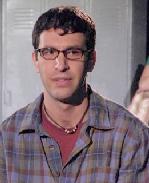
David Perlman as Calvin in Barrington Stage Company's Theater Lab production of Calvin Berger.
(Photo: Kevin Sprague)
|
So here we go again
We're two imperfect men
One with beauty,
One with a mind,
Working wonders when combined
— Calvin & Matt in " We're the Man" reprise.
We're two imperfect men
One with beauty,
One with a mind,
Working wonders when combined
— Calvin & Matt in " We're the Man" reprise.
The story of Cyrano de Bergerac, he of the famously long nose that doomed his love for the beautiful Roxanne, musicalized and transposed into a modern American high school setting? A far-fetched idea or an ingenious way to update a story so familiar it no longer holds any surprises?
Bringing Cyrano into an anywhere-USA high school as Calvin Berger actually struck me as a dandy idea for launching the second season of the Musical Theater Lab. After all, my reservations about seeing the summer '04 revival of Cyrano at Barrington Stage (Cyrano review) proved to be completely unfounded because Julianne Boyd managed to breathe fresh life into the often staged play. The success of musicals about tweens and teens — Hairspray, Barrington's own big hit, The 25th Annual Putnam Country Spelling Bee and most recently the Disney phenomenon High School Musical (A Barrington Stage version of which is slated to play at a local church later this summer) supports the likelihood of its being an apt LAB vehicle. And so it is!
It doesn't have blockbuster written all over it the way Spelling Bee did, but it's an appealing little show that may with some trimming well have a life in other small theaters or schools. To call it ingenious would be an overstatement, but the connection of the characters to the audience is genuine despite their sitcom-ish familiarity.
The book concocted by Barry Wyner, who's also the composer and lyricist, is a loose enough update of the Cyrano story to make it fun and believable rather than far-fetched, with words of love spoken by Cyrano from beneath Roxanne's balcony transmitted via notes and cellphone. Calvin, like his literary forebear obsesses about his nose, which he refers to as the Mount Everest "God parked in his face." But David Perlman who portrays Calvin is not movie-star handsome but not really bad looking at all. And that's Wyner's point as summed up in a group song called "Security Meltdown" — today's teens, like their parents and grandparents before them, tend to be insecure and thrown into panic mode by their perceived imperfection.
And so Calvin knows that gorgeous girls like Rosanna (Elizabeth Lundberg) fall in love with hunks like new kid on the block Matt (Aaron Tveit) and view boys like him as friends, just as he looks on chunky Bret who adores him (Gillian Goldbert) as a pal. Besides the quick-witted and word savvy Calvin's scheme of providing Matt with romantic notes to make Rosanna believe he's as smart as he is sexy looking, there's a subplot involving starving tots for whom Rosanna, who'd like to be more than just a pretty face, is raising money. This ramps up the feel good ending and provides Wyner with a chance to introduce a running double entendre joke (one of several). Obviously, there are no surprises here except for the positive response from the audience, most of whom at the press opening I attended were long past their own teens.
What about the songs? While the lyrics are catchy and clever the score falls short of being memorable. This is not helped by its being arranged for a single piano, or by having the full company numbers and even some of the solos too often belted out presentational style and too loud. No wonder that the scenes between David Perlman and Aaron Tveit, which tend to be more physical, are the most enjoyable and that their " We're the Man" and "Never Know" are the standout songs. Tveit has a particualarly graceful physicality.
The stagecraft is strictly low budget. However, this has not prevented set designer Brian Prather, costume designer Amela Baksic and lighting designer Scott Pinkney from creating the just right atmosphere for the problems to unfold and happily resolve themselves.
Of the three plays scheduled for this LAB season, Calvin Berger is the only one fully staged and with a previous developmental production under its belt. That production, also helmed by Stephen Terrell and with Gillian Goldberg as Bret, ran briefly at Gloucester Stage where it garnered a Jerry Bock Award and Richard Rodgers Award, for best new play. The preparation for this staging was a chance for Wyner to refine it as part of William Finn's mentoring program.
To sum up the LAB's production, this paraphrase from the show's finale: It's far from perfect/ but it could be/ a perfect night out for you.
Reviewed by Elyse Sommer on July 3rd
| Calvin Burger Book, music & lyrics by Barry Wyner. Directed & Choreographed by Stephen Terrell. Musical Director: Justin Paul Cast:David Perlman (Calvin), Elizabeth Lundberg (Rosanna), Aaron Tveit (Matt), and Gillian Goldberg (Bret). Sets: Brian Prather Costumes: Amela Baksic Lighting: Scott Pinkney Review by Elyse Sommer based on July 3rd performance |
|
Musical Numbers
| |
Act One
|
Act Two
|
Funked Up Fairy Tales
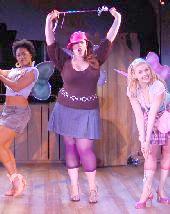
(l-r): Rashidra Scott, Alysha Umphress and Christy McIntosh as three magical fairies with wings, wands and funk.
(Photo: Brian Barnett) |
Now, Childs has invested her multiple talents in another brand-new musical fun and games show that adds a new chapter to the fractured fairy tale tradition popularized with the Rocky & Bullwinkle cartoons and on the musical stage by Stephen Sondheim's thrillingly dark Into the Woods. Childs' new work has been mentored this summer in William Finn's Theater Lab and was scheduled to be tested out on audiences, but not critics.
The title Funked up Fairy Tales may be somewhat off-putting to adults. It is indeed family friendly though not for families with very young children. Contrary to initial plans to do a bare bones staging (meaning zero or super minimal sets and costumes) Childs' multi-racial, musical spin on easily recognized folk tale heroes, heroines and villains has been funked up with what is, at least for the Pittsfield library's basement stage, fairly elaborate scenery (by Brian Prather) and a quite amazing number of funky costumes (Matthew Hemesath). Furthermore, apparently encouraged by audience response during the first week of the limited workshop run, it has been extended by a week during which critics have been invited to speak their piece.
Despite the additional funk and flash, the show is clearly still in development and should not be judged as "frozen" since it needs more work (the middle calls for focus and sag control, the third part needs trimming, and Childs' typically eclectic mix of musical styles would have less of a repetitive beat and a more of a show tune bounce if orchestrated for a larger band). That said, it's far better and certainly more cohesive than the messy Party Come Here that was given a fancy world premiere at Williamstown's Nikos Stage earlier this season (see our Williamstown review page)— but neither is it sophisticated enough to foresee with certainty that it may become as long-running a hit as Altar Boyz, which grew out of another lab (the New York Musical Theater Workshop) and whose bookwriter, Kevin Del Aguila, is at the helm of this workshop production.
Like all fairy tales, the three pieces are not without their morals, but the emphasis throughout the intermissionless 100-minutes is on loony tunes type of fun and getting laughs. Which it does, especially during the first part.
The three main folk tales are tied together by three magical fairies named Magikwanda, Faireetheeya and Titania who would fit as easily into any Valley girl TV show or movie as an ancient fable. Besides playing the fairies Rashidra Scott, Alysha Umphress, Christy McIntosh also take on various other female roles. Edwina Findley rounds out the female cast in roles like the mother of the first tale's handsome prince who happens to be a pig (until kissed), a busybody neighbor and a black medium in the middle tale, Tammi-Lynn. Though too unfocused this piece does have a nice ballad in "The Moon and the Stars" sung by the excellent Demond Green. Heath Calvert, has the tall good looks and voice to do justice to assorted princes.
Next up at the Musical Lab is another show inspired by children's literature, The Mysteries of Harris Burdick adapted from a picture book by Chris Van Allsburg by Nathan Tysen and Chris Miller who were part of the creative team for last season's Lab hit, The Burnt Part Boys. Stay tuned as to whether it too will be more fully staged than previously announced and opened up for review.
—Reviewed by Elyse Sommer.
|
Funked Up Fairy Tales Book, music & lyrics by Kirsten Childs Directed by Kevin Del Aguila Musical Director: Darren R. Cohen Cast: Heath Calveri, Edwina Findley, Demond Green, Christy McIntosh, Rashidra Scott, Alysha Umphress Sets: Brian Prather Costumes: Matthew Hemesath Lights: Jeff Davis Sound: Daniel A. Little Band: John Werking, pianist; Eric Day, electric bass & acoustic guitar —Reviewed by Elyse Sommer SONGS K-Pig Prologue Company Three Magical Fairies / Magikwanda, Faireetheeya, Titania Ersilia's Dream / Ersilia Family Honor / King Leo, Company I Wanna Get Married Momma (Even Though I'm a Pig) /K-Pig, Ersilia Don't Look for Nothin' That Can't Be Found / Meldina, Company Tammi-Lynn Tammi-Lynn /Jimmy-John, Tammi-Lynn The Moon and the Stars / Elvis Carter Hall Ball /Faireetheeya, Magikwanda, Elvis Tommi-Lynn (Reprise) /Jimmy-John, Tammi-Lynn HeyBeyonce/Beyonce, Company Intervention / Jimmy-John, Tammi-Lynn, Company Tammi-Lynn (Final Reprise)/ Tammi-Lynn, Jimmy-John, Miz Tringle Mistah Skin Thrill of Love / Hank, Aisha Reality Show Wife / Hank, Company Brag on Your Daughters /Lord High Chamberlain, The Miller, The Tapestry Maker, Aisha, La Treecia Straw Into Gold/ Rumpelstiltskin, Company On Bended Knee /Hank, Aisha Rumpelstiltskin/ Rumpelstiltskin, Magikwanda, Titania, Forest Creature Hand Over the Baby / Rumpelstiltskin, Aisha, Magikwanda, Titania, Hank Epilogue /Company |
The Mysteries of Harris Burdick
This concluding presentation of the 2007 Lab was adapted from a picture book by Chris Van Allsburg, with a book and direction by Joe Calarco, music by Chris Miller and lyrics Nathan Tysen — all part of the creative team for last season's Lab hit, The Burnt Part Boys. While not open for review, here's a bit of background about the Van Allsburg book to make you understand what drew this creative trio to the project:
Chris Van Allsburg's books aren't your typical children's books and The Mysteries Of Harris Burdick embodies his mission to ignite the imagination with just one or two sentences to go with his evocative, photograph-like black and white pictures. In short, those pictures and those few words allow the viewer to give free reign to whatever comes to mind. Thus, the reader becomes the storyteller. It will thus come as no surprise to see the author's mission integrated into this musical adaptation's sensibility and Calarco's staging.
Since the show isn't open to review, I'll just list the, as usual, well-credentialed equity cast: Donna Lynne Champlin, last seen in John Doyle's exciting Broadway revival of Sondheim's Sweeney Todd; Charlie Bradie, whom you'll recognize from Burnt Part Boys; also Michael Winther, Caroline McMahon, Lynne Wintersteller and Matt Caplan.
Wicked Tickets
Jersey Boys Tickets
Little Mermaid Tickets
Lion King Tickets
Young Frankenstein Tickets

Easy-on-the budget super gift for yourself and your musical loving friends. Tons of gorgeous pictures.

Leonard Maltin's 2007 Movie Guide

At This Theater
Leonard Maltin's 2005 Movie Guide

 >
>

Jersey Boys Tickets
Little Mermaid Tickets
Lion King Tickets
Young Frankenstein Tickets

Easy-on-the budget super gift for yourself and your musical loving friends. Tons of gorgeous pictures.

Leonard Maltin's 2007 Movie Guide

At This Theater
Leonard Maltin's 2005 Movie Guide

 >
>

